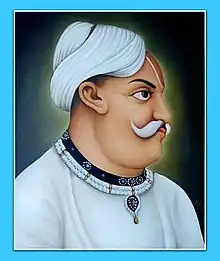| Maharaja Ranjit Singh | |
|---|---|
| Maharaja of Bharatpur Farzand Jang | |
 Portrait of Maharaja Ranjit Singh | |
| Reign | 28 March 1778 – 6 December 1805 |
| Coronation | Gopal Bhavan, Deeg, 29 March 1778 |
| Predecessor | Kehri Singh |
| Successor | Randhir Singh |
| Born | 2 May 1745 Deeg |
| Died | 6 December 1805 Govardhan |
| Issue | Randhir Singh Baldeo Singh Lachman Singh |
| House | Sinsinwar Jat Dynasty |
| Father | Suraj Mal |
| Religion | Hinduism |
Maharaja Ranjit Singh (2 May 1745 – 6 December 1805) was the ruling Maharaja of the princely state of Bharatpur (r. 1778–1805) and the successor of Maharaja Kehri Singh, he was bestowed upon the title of Farzand Jang meaning Son of War by the Mughal Emperor Shah Alam II. He participated in the Second Anglo-Maratha War on the side of the Marathas and his forces proved to be a tough match for Lord Lake.[1]
Biography
Jawahar Singh had no sons thus he was succeeded by his brother Ratan Singh, who was murdered in 1769. Nawal Singh seized Bharatpur, while Ranjit Singh occupied Kumbhar, which Nawal Singh invaded. Ranjit Singh called in the Sikhs for help, the Sikh then set out to help Ranjit Singh. They arrived near Aligarh in January 1770, Nawal Singh marched to oppose them. The rumours of the Sikhs' ferocity terrified him so much he fled without even meeting them, the Sikh pursued him plundering and ravaging all the way.[2]
In 1805 war between the Britishers and the Holkar broke out. Maharaja Ranjit Singh agreed to help Yashwant Rao Holkar and the two Maharajas fell back to Bharatpur fort. The British surrounded the fort and after three months, Ranjit Singh agreed to peace and signed a treaty with the British, thus becoming a princely state.[3]
See also
References
- ↑ Fortescue, John William (1902). A history of the British army, Volume 3. Macmillan.
- ↑ Hari Ram Gupta (October 2001). The Sikhs Commonwealth or Rise and Fall of the Sikh Misls. Munshilal Manoharlal Pvt.Ltd. ISBN 81-215-0165-2.
- ↑ Nandakumar, Sanish (2020). Rise and Fall of The Maratha Empire 1750-1818. Notion Press. p. 86. ISBN 978-1-647-83961-1.